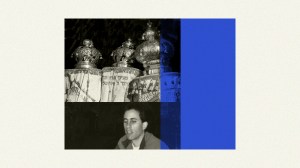In this series

(Last of a series. For previous episodes, look here, here, and here.)
I’ve dealt with heavy topics the past three days: tragedy, Talmud, messiah. Let’s conclude this brief tasting session with a quick run-through of the minimum evangelicals should know about the one thing that unites Jews, whether Orthodox, Conservative, or Reform: holidays (although ways of celebrating them vary enormously).
Two major holidays are Rosh Hashanah—we could call it not only New Year’s Day but also “new universe day” since it celebrates God’s creation of everything—and Yom Kippur, the Day of Atonement. Three traditional festivals are also important: Passover, Shavuot, and Sukkot. Like all Jewish days, the holidays start in the evening and run from just before sunset to nightfall.
Passover is an eight-day spring holiday that celebrates Israelite liberation from Egyptian slavery, as related in the Book of Exodus. The holiday is marked by two Seders—ceremonial dinners—and the exclusion from the household of anything that contains leaven. That commemorates the need to escape from Egypt so quickly that the Israelites did not have time to let their bread rise, but it also symbolizes removal of “puffiness,” pride.
Shavuot, coming 50 days after Passover, is when rabbis said God gave Moses the Ten Commandments. Christians know it as Pentecost. Shavuot services include reading the Book of Ruth for three main reasons: Shavuot was at wheat-harvest time in ancient Israel. Tradition says Ruth’s descendant King David was born and died on Shavuot. Ruth’s conversion to Judaism was her entry into the covenant of the Torah, as Israel entered into it at Mount Sinai.
Sukkot, a fall harvest festival, is historically important, but its proximity to Rosh Hashanah and especially Yom Kippur leaves it in the shadows of public awareness (though not for Orthodox Jews). Jews, including many non-Orthodox ones, fast on Yom Kippur in the hope that God will forgive their sins. Some also refrain from sex, bathing, and wearing leather shoes.
I don’t want to overemphasize the colorful, but some Orthodox Jews practiced on Yom Kippur a traditional atonement ritual called Kapparot in which they swung a chicken over the head while chanting a prayer for atonement. They then slaughtered the chicken and gave it to the poor, dramatically bringing home the teaching that apart from God’s mercy the person would be slaughtered.
Jews today celebrate the minor holiday of Hanukkah much more festively than they did in the past—likely due to its proximity to Christmas, which makes some Jewish parents imitate their neighbors in gift giving. Hanukkah does differ from Rosh Hashanah and other major holidays by having no restrictions on work. Hanukkah celebrates the victory of Jewish rebels over a remnant of Alexander the Great’s empire in 165 BC. The Greco-Syrians in charge of Palestine thumbed their noses at Judaism by sacrificing pigs on the temple altar, and a revolt began.
The Maccabees’ triumph led to a rededication of the temple in Jerusalem, which needed a lamp that would keep burning day after day.Although the lamp had only a one-day supply of oil, according to Jewish tradition it miraculously burned for eight days. That was enough time to get a fresh supply of oil, so Hanukkah lasts for eight days and spreads out the presents.
Purim is a festive holiday, also without a work restriction, near the end of winter. It commemorates the narrow Jewish escape from destruction recorded in the Book of Esther. Haman, an early Hitler in ancient Persia, wanted to kill all the Jews, but a providential ordering of events led to his death and Jewish triumph.
The Jewish calendar has other happy days, including Simchat Torah (which means “joy of the Torah”) and the weekly relief of a Sabbath, which, for Orthodox Jews, means freedom from good things that can enslave us, like motors and screens. But in Jewish history sad days seem to have been more common.
That brings us back to Tisha B’Av, the preeminent day of mourning in the Jewish calendar but one less frequently observed in American Judaism. After all, if politics is a measure of popularity, why mourn when 2 percent of the population produces 9 percent of the US Senate and 5 percent of the House of Representatives?
The 20th century in American culture was in some ways a Jewish century. Why mourn when an immigrant like Israel Beilin, who changed his name to Irving Berlin, had the opportunity to produce hugely popular songs like “God Bless America” and “Puttin’ on the Ritz” and George Gershwin could compose “Rhapsody in Blue” and Porgy and Bess?
Why mourn when Jews could find a home in Hollywood? Szmuel Wonsal changed his name to Sam Warner, one of the Warner brothers of film history, and some of the results were The Adventures of Robin Hood and Casablanca. Other Jewish-created studios produced films about individuals standing up to the crowd: Mr. Smith Goes to Washington, High Noon, and more.
Why mourn when Jewish comedy dominated laugh tracks: Groucho Marx, George Burns, Sid Caesar, Milton Berle, Jackie Mason, Billy Crystal, Jon Stewart, Joan Rivers, Bill Maher? Nevertheless, the catch phrase of comedian Rodney Dangerfield (born Jacob Cohen), “I don’t get no respect,” became famous.
For centuries Jewish boys gained respect by studying throughout the day. Adult males were to study whenever they could. Jews faced communal and internal pressure to excel. Since they needed to live close to each other—within easy walking distance of a synagogue so as not to break rules against traveling on the Sabbath—they faced constant competition from peers who also had to live by their wits.
Given centuries of Jewish response to threats, we don’t need DNA explanations of why Jews, as I noted in beginning this series, have garnered one-third of all Nobel Prizes won by Americans. Brainwork has consequences. Beyond that, God told Abraham in Genesis 12:3, “In you all the families of the earth shall be blessed” (ESV), and he repeated that in Genesis 22:18: “In your offspring shall all the nations of the earth be blessed” (ESV).
That promise is spiritually fulfilled in the coming of Abraham’s descendant Jesus, the Messiah. Maybe it’s also physically promoted in the way Selman Waksman, a Jewish immigrant from Russia, discovered in the 1940s streptomycin, the first effective antibiotic against tuberculosis, the deadliest disease in America early in the twentieth century. He and other Talmudic students who won Nobel Prizes for medicine showed that theology has multiple consequences.
















